Godfrey Family Crests. Which Godfrey is your family?
You searched for 'Godfrey', but there are 13 families with that name in our historic records. Do you know where your family came from, recognise the name of an ancestor or see your crest? If so, please click on your family from the list below..
SELECT YOUR CREST TO SEE AVAILABLE SILVER
AND REGISTER FOR SALE ALERTS
-
 Godfrey
Godfrey
Kent and Middlesex
Select
-
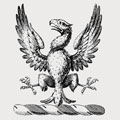 Godfrey
Godfrey
Select
-
 Godfrey
Godfrey
Select
-
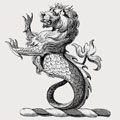 Godfrey
Godfrey
William Bernard, Old Quarry Hall, Blechingley
"Deus et libertas"
Select
-
 Godfrey
Godfrey
Ingram Fuller Brook St. House Ash-next-Sandwich Kent
Select
-
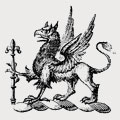 Godfrey
Godfrey
Sir William Cecil Bart. (baronet) of Bushfield co.…
"Deus et libertas"
"God friend"
Select
-
 Godfrey
Godfrey
A.C., M.D. Freemantle Southampton
"Deus et libertas"
Select
-
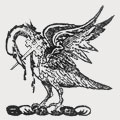 Godfrey
Godfrey
Staffordshire and Warwickshire
Select
-
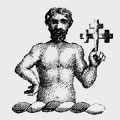 Godfrey
Godfrey
Hurst and Romney, co. Kent; in the reign of Charles…
Select
-
 Godfrey
Godfrey
Lydd, Heppington, Hodiford, Norton Court etc., co.…
"Corde fixam"
Select
-
 Godfrey
Godfrey
Peter Godfrey Esq. Taken from an 18th century bookplate.…
"Corde fixam"
Select
-
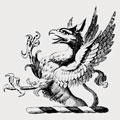 Godfrey
Godfrey
Select
-
 Godfrey-Faussett
Godfrey-Faussett
Godfrey Trevelyan, 17, Belgrave Road, S.W.:
"Fortiter si forsitan"
"Post spinas palma"
Select
Godfrey
Godfrey Family History
The origins of the name Godfrey are Anglo Saxon and the family is of great antiquity in Kent. Godfrey is mentioned in the Domesday book as holding manors in Petham, West Farleigh, Lenham and Sheppey. According to Burkes General Armory Henry II (1133-1189 and King of England 1154-1189) granted the manors of Aldington and Hurst together with other lands near Romney in Kent to Godfrey Le Fauconer. Some of these lands were still in the possession of his descendants in the late 19th century. Although there is some doubt, it is likely that Godfrey was known by the name Le Fauconer (the Falconer) because of his manor at Fauconers Hurst (a hurst was a wooded hill deriving from the Anglo Saxon "hyrst").
In subsequent generations the family spread into other parts of the United Kingdom and it is highly probable that most of the families bearing that name whose crests are shown above are descended from Godfrey Le Fauconer. The Godfrey Baronets are descended from a branch that settled in Ireland in the time of Charles II (King of England from 1660-1685).
The original, Kent, branches of the family have traditionally used a demi saracen holding in the dexter hand a cross crosslet fitchee. The 18th century bookplate shown below for Peter Godfrey Esq. has the arms and motto of the Kent family but the demi man looks more like an african than a saracen. This is more likely to be an engravers interpretation rather than a new crest. The use of images that evoke a connection with the Holy land and the crusades were considered to confer honour upon the family. Over time the terms "moor" and "saracen" became interchangeable and in the absence of images to guide them many engravers made them look like africans.
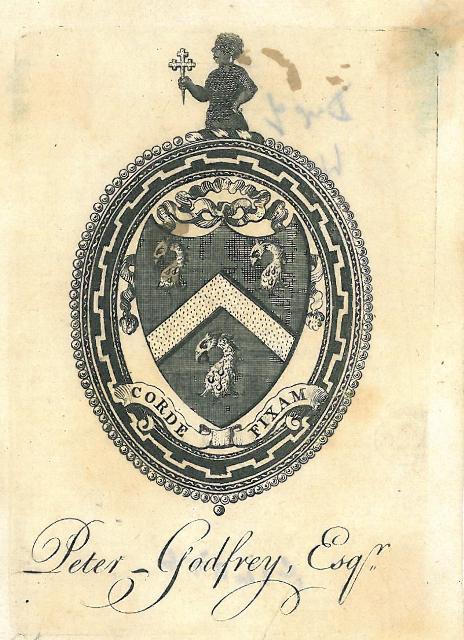
Godfrey is one of the few names that have the unusual distinction of having become over time a commonly used forename. Surnames have been adapted for use as forenames for many centuries; often as a means of emphasising family connections in a complimentary and aggrandising manner. Occasionally the name becomes better known as a forename than as a surname. Though the use of Godfrey as a forename has fallen away in the late 20th century, in part (I suspect) due to the image portrayed by the elderly, weak bladdered, Godfrey in the popular British sitcom "Dads army".